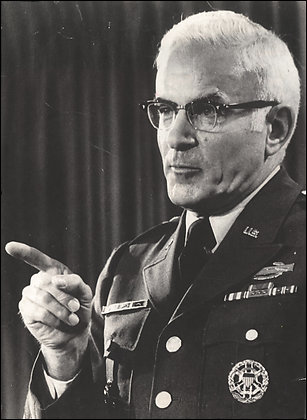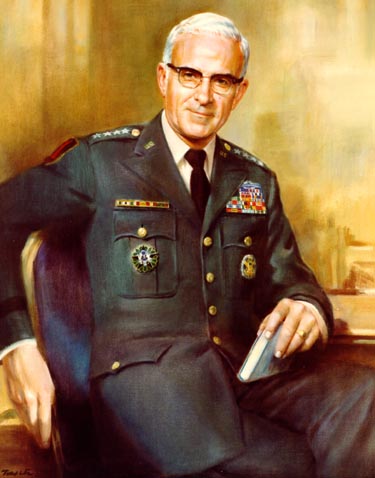<Back to Index>
- Inventor John Kay, 1704
- Composer Eugène Ysaÿe, 1858
- Supreme Allied Commander, Europe General Bernard William Rogers, 1921
PAGE SPONSOR



Bernard William Rogers (July 16, 1921 – October 27, 2008) was an American general who served as Chief of Staff of the United States Army, and later as NATO's Supreme Allied Commander, Europe and Commander in Chief, United States European Command.
Rogers was born in Fairview, Kansas, on July 16, 1921. He spent a year at Kansas State University before receiving an appointment to the United States Military Academy in 1940, where he was First Captain of the Corps of Cadets. He graduated in June 1943 as a second lieutenant of the Infantry assigned to the 275th Infantry, 70th Infantry Division, and attended the officer basic course at the U.S. Army Infantry School at Fort Benning. Rogers was promoted to temporary first lieutenant in December 1943, and returned to West Point as an instructor of economics, government, and history, from 1944 to 1946, receiving a promotion to temporary captain in February 1945. He next served as aide to the High Commissioner to Austria and to the commander of the Sixth Army from 1946 to 1947. In 1947 he attended Oxford University as a Rhodes Scholar, graduating with a Bachelor of Arts in Philosophy, Politics and Economics in 1950 (he was later awarded an MA in the same subject). During his time at Oxford he was promoted to permanent captain.
Following graduation he was aide to the chief of Army Field Forces from 1950 from 1951, being promoted to temporary major in July 1951. He graduated from the Infantry School advanced course in 1952. Rogers was then deployed to the Korean War where he commanded the 3d Battalion, 9th Infantry from 1952 to 1953, being promoted to temporary lieutenant colonel in August 1953. He next was aide to the commander in chief and staff intelligence officer of the United Nations and Far East Commands from 1953 to 1954. Rogers returned stateside and graduated from the Command and General Staff College at Fort Leavenworth in 1955. He next commanded the 1st Battalion, 23d Infantry from 1955 to 1956, then served in the Coordination Division, Office of the Chief of Staff from 1956 to 1958. This was followed by duty as executive and senior aide to the chief of staff from 1958 to 1959 and promotion to permanent major January, 1959 and temporary colonel in September, 1959. He was selected to attend the Army War College and graduated in 1960, going on to command the 1st Battle Group, 19th Infantry, 24th Infantry Division in Europe from 1960 to 1961. His next assignment in the division was as chief of staff and he also served as chief of the Troop Operation Branch, Operations Division, United States Army, Europe from 1961 to 1962. Rogers next duty was as military assistant and executive officer to the chairman of the Joint Chiefs of Staff from 1962 to 1966.
He was promoted to permanent lieutenant colonel in January 1964 and temporary brigadier general in October 1966, moving on to become the assistant division commander of the 1st Infantry Division in Vietnam operations from 1966 to 1967. He again returned to West Point as commandant of cadets from 1967 to 1969, being promoted to permanent colonel in June 1968. He was chosen for division command, commanding the 5th Infantry Division (Mechanized), and he also commanded Fort Carson, Colorado, from 1969 to 1970 and was promoted to temporary major general in February 1970 and permanent brigadier general in August 1971. He was promoted to temporary lieutenant generalin November 1972, and permanent major general in June 1973 while serving as deputy chief of staff for personnel of the Army, from 1972 to 1974. He was promoted to temporary four - star General in November 1974, and was chosen to command the United States Army Forces Command at Fort McPherson from 1974 to 1976. Following this assignment he was selected to be Chief of Staff of the United States Army, a post he held from October 1, 1976, until June 21, 1979. Some highlights of his tenure include supervising the Army's move to a 24 division, all - component force; establishing priorities for near term readiness, midterm modernization, and long term sustainability; establishing a program to enhance the quality of life of Army personnel; and suggesting a limited draft to fill the Individual Ready Reserve. He was appointed Supreme Allied Commander, North Atlantic Treaty Organization in July 1979, and retired from active service in June 1987.
When the Reagan administration signed a treaty with the Soviet Union requiring each side to withdraw intermediate range missiles from Europe, General Rogers called the agreement "foolish." He said the Warsaw Pact's superiority in foot soldiers and conventional weapons left NATO forces at risk of being quickly overrun.
His stance drew a pointed rebuke in 1987 from Secretary of State George P. Shultz, who called the general's comments "way out of line." General Rogers soon retired.
General Rogers, who spent 44 years in uniform, had an unusual combination of talents as a combat commander, intellectual and statesman. While addressing a NATO conference in 1979 the former Rhodes scholar said, "One cannot help but to be impressed -- perhaps depressed is the better word -- by the folly, futility and waste of war as a means of resolving man's problems."
After World War II, he was briefly an aide to General Mark Clark, the commander of U.S. forces in Austria. In 1947, General Rogers received a Rhodes scholarship to England's University of Oxford, from which he received bachelor's and master's degrees in economics and philosophy.
He was a decorated infantry commander in the Korean War and held intelligence positions before becoming executive officer to Maxwell D. Taylor, Chairman of the Joint Chiefs of Staff, in 1962.
As assistant commander of the First Infantry Division in Vietnam in 1966 and 1967, General Rogers was awarded the Distinguished Service Cross — the Army's highest award for valor after the Medal of Honor — for leading a successful counterattack against a Vietcong raid on a South Vietnamese special forces camp. He rallied troops on the ground and personally scouted enemy positions from a low - flying helicopter under heavy fire.
After two years as Commandant of the Corps of Cadets at West Point, General Rogers took command of the Fifth Infantry Division in Fort Carson, Colorado, in 1969. At a time of falling morale, he made sweeping changes in the daily routine of soldiers by abolishing kitchen duty (KP), reveille, roll call and Friday night "GI parties", in which soldiers scrubbed the barracks for Saturday inspections.
He established councils for junior officers, enlisted men and racial minorities to express their concerns and set up a Greenwich Village - style coffeehouse, complete with folk singers. Old - line officers were aghast, but enlistments soared, and General Rogers became known as one of the brightest thinkers in the Army. He continued the reforms as Army chief of staff from 1976 to 1979, improving training programs and developing plans for a modern "quick - strike" force. He also took steps to make the Army more friendly toward women and minorities, calling on commanders to "eliminate any discriminatory handling of soldiers."
Despite his charmed career, General Rogers was eager to leave the bureaucratic labyrinth of the Pentagon behind when he assumed his NATO post in Belgium.
"You've heard that phrase from a country song that goes: 'Happiness is Lubbock, Texas, in the rearview mirror'?" he said. "Well, for me, happiness is the Pentagon in the rearview mirror."
General Rogers could be "suave and poised and intimidating", Major General Dewitt C. Smith once said, but he was also known to break into song on occasion, with Frank Sinatra's "My Way" a particular favorite.
Besides the Distinguished Service Cross, General Rogers's decorations included the Defense Distinguished Service Medal, the Silver Star, four awards of the Legion of Merit and three awards of the Distinguished Flying Cross.
After
his retirement in 1987, he was a director of the Council on Foreign
Relations and the Atlantic Council of the United States. He served on
the boards of the USO and the Association of the U.S. Army and was a
consultant and director to several companies, including Coca - Cola and
General Dynamics. Rogers married Ann Ellen Jones in 1944. He was an Honorary Director of The Atlantic Council of the United States, and sat on the Association of the United States Army's Council of Trustees. He was also a supporter of the Comprehensive Test Ban Treaty. He was an Honorary Fellow of University College, Oxford University, a member of the Council on Foreign Relations, of Phi Delta Theta Fraternity, and a Patron Councilor of the Atlantic Council of the U.S. Gen
Rogers died at Inova Fairfax Hospital, Virginia, after suffering a
heart attack. Survivors include his wife of 63 years, Ann E. Rogers of
McLean; three children, retired Army Colonel Michael W. Rogers of
Manassas, Diane Opperman of Arlington and Susan Kroetch of Alexandria;
a sister; a brother; six grandchildren; and three
great - grandchildren.Gen. Rogers was buried at West Point. Other honors
and awards he has received include: